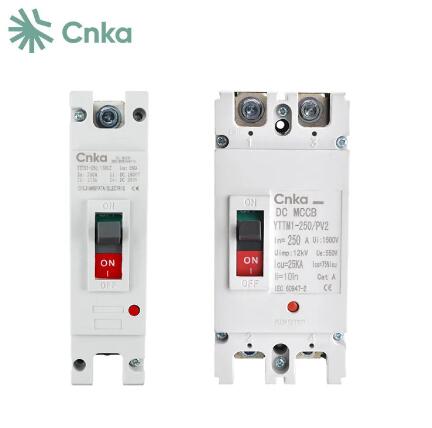Understanding DC MCCBs: A Crucial Component for DC Applications
2024-08-22
In the world of electrical protection, Molded Case Circuit Breakers (MCCBs) are widely recognized for their reliability and efficiency in safeguarding electrical circuits from overloads and short circuits. While most people are familiar with MCCBs in AC (alternating current) systems, there's a growing demand for MCCBs specifically designed for DC (direct current) applications. In this blog, we'll explore what a DC MCCB is, why it's essential for DC systems, and how it differs from its AC counterparts.
What is a DC MCCB?
A DC MCCB (Molded Case Circuit Breaker) is a protective device designed specifically for use in direct current circuits. Like their AC counterparts, DC MCCBs are responsible for automatically interrupting the flow of electricity when an overload or short circuit is detected. However, due to the unique characteristics of DC, these breakers are engineered differently to handle the challenges presented by direct current systems.
Why is DC Protection Different?
DC circuits behave differently from AC circuits, primarily because of the nature of the current flow. In AC systems, the current alternates direction, which naturally helps in extinguishing electrical arcs when a circuit is interrupted. In contrast, DC maintains a constant flow in one direction, which makes it more challenging to break the circuit and extinguish the arc. This continuous flow can result in sustained arcing when the circuit is opened, posing a significant safety hazard if not properly managed.
Key Features of DC MCCBs
1. Arc Quenching: One of the primary design considerations for DC MCCBs is their ability to extinguish the arc that forms when the circuit is interrupted. These breakers are equipped with enhanced arc quenching chambers that effectively dissipate the energy and extinguish the arc quickly.
2. Contact Design: The contacts in DC MCCBs are designed to separate rapidly and are often made from materials that can withstand the higher energy levels associated with DC arcs. This design helps minimize contact erosion and prolongs the life of the breaker.
3. Breaking Capacity: DC MCCBs are rated for their ability to interrupt higher current levels without damage. The breaking capacity is a critical specification that ensures the breaker can safely interrupt the current without failing.
4. Polarity Consideration: Unlike AC MCCBs, which are generally polarity insensitive, DC MCCBs may need to account for polarity, as the direction of current flow can impact performance. Some DC MCCBs are designed to be polarity-specific, while others are designed to handle bi-directional current flow.
Applications of DC MCCBs
DC MCCBs are used in a variety of applications where DC power is utilized. These include:
- Renewable Energy Systems: Protecting circuits in solar power installations where DC power is generated and managed.
- Electric Vehicles (EVs): Safeguarding the DC circuits in electric vehicle charging stations and onboard systems.
- Telecommunications: Ensuring the protection of DC-powered telecommunications equipment and battery backup systems.
- Industrial Automation: Protecting DC motors and control circuits in industrial automation and process control systems.
- Data Centers: Managing the protection of DC power distribution systems in modern data centers.
Why Choose a DC MCCB?
Choosing the right circuit protection for DC applications is critical for ensuring system safety and reliability. DC MCCBs are specifically designed to handle the unique challenges of DC systems, providing superior protection compared to using AC MCCBs inappropriately. The enhanced arc quenching, specialized contact design, and higher breaking capacity make DC MCCBs indispensable in environments where DC power is prevalent.
Conclusion
As the demand for DC applications continues to grow, particularly in renewable energy, electric vehicles, and industrial automation, the importance of using DC-specific protection devices like MCCBs cannot be overstated. Understanding the unique requirements of DC systems and selecting the appropriate DC MCCB ensures the safety, efficiency, and longevity of your electrical infrastructure.



